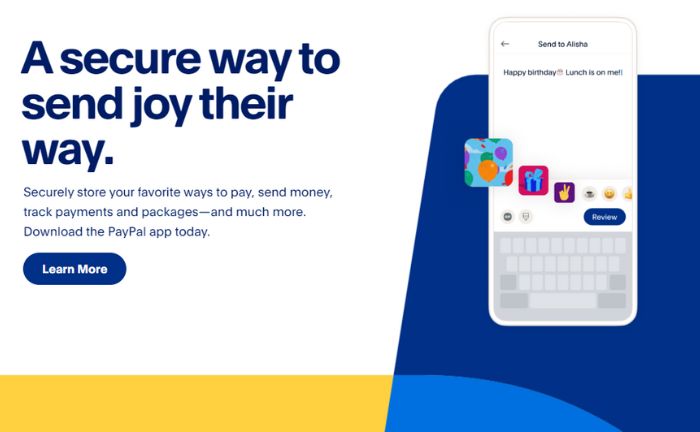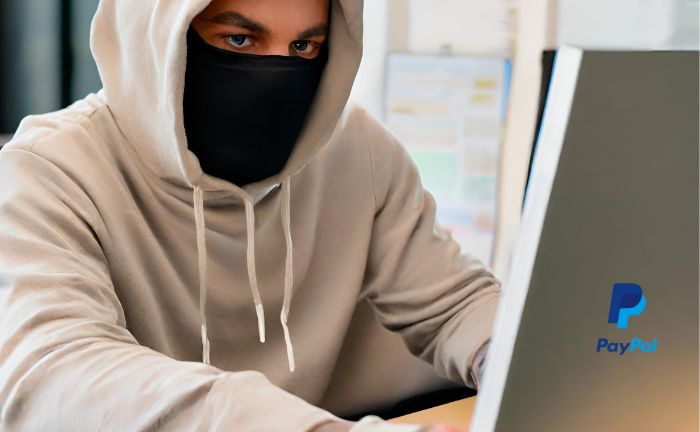Did you know that PayPal has updated its application to prevent possible fraud during transactions? This is because there have been complaints about people using this virtual wallet to commit illegal acts. One of the most common scams used today is through email.
In general, many put “PayPal Services” or something related to the online payment system in the subject line and write pleasantly to attract the sender’s attention and make them believe that the company is communicating with them.
The reality is that these online scammers use this means, but the first thing you should do is see the email from which they sent you the mail. For example, if it is “abcde1234@gmail.com”, it is a fake email. You can delete it and report it as “spam” in these cases.

PayPal mentions on its website other prevalent types of virtual scams and that, in addition to being done through this platform, they are also done in others of the same style, such as CashApp or Venmo.
It’s essential always to be cautious of online offers that seem too good to be true, as scammers often use tactics like advance commission fraud to trick individuals into sending them money. While most people are wary of strangers approaching them on the street with offers that seem too good to be true, they tend to let their guard down online.
If you receive an offer of free money, it is likely a scam. These scams often involve the scammer asking for a smaller amount of money upfront, citing reasons like taxes or legal documents, before they can send you the promised millions of dollars.
Beware of e-mails and fake charity donation
It’s also important to be cautious when receiving emails claiming you have received payment on platforms like this electronic alternative to traditional payment methods, mainly before shipping an item. Always take a moment to log into your PayPal account to ensure the transfer of funds before proceeding with any shipment.
https://www.tiktok.com/@fayeluvsyou/video/7277960004399811883?q=paypal%20fraud&t=1695404124216
Additionally, avoid clicking on links provided in emails. Instead, always open a browser window and enter the website directly to ensure your safety. Scammers often offer high returns with no risk and emphasize “Act now!” to lure victims into their traps.
When it comes to donating to charities, especially during times of disaster, it’s essential to be cautious and avoid fraudulent charities. Scammers often use fake charities to trick people into donating to their cause. Always take the time to review a charity’s track record carefully to ensure that your donation is going to real victims.
Be wary of charities that do not have a website, and always do your research before donating.
Common types of PayPal fraud
PayPal, being a platform widely used for financial transactions, is not an exception to the risks of fraud and scams. That is why if you notice something strange or get a message or something from the PayPal team, you should verify it because it could be hazardous, especially if you pass your data, something that PayPal would never ask for. Knowing the most common types of PayPal fraud is essential to protect yourself and your assets.
These schemes can range from phishing emails that attempt to steal your login credentials to deceptive tactics that induce you to send items without legitimate payment. By knowing these fraudulent tactics, you can better protect yourself and your financial interests using PayPal’s services. Some of the most common frauds in the financial app are:
- You have received a payment
Some fraudsters may make you believe you have received a payment. They want to get what you are offering without paying for it. Before shipping an item, it’s a good idea to log into your PayPal account and confirm receipt of the payment.

- Overpayment Alert
Scammers may try to convince you that they’ve sent you an excessive amount of money. This may be more than they legitimately owe you. For example, a phishing email may claim that you have been paid $600 for an item listed for $350. The sender might then ask you to forward the item and the extra $250 you accidentally “overpaid.”
In this scenario, the fraudster wants the item and your money even though you have not made a legitimate payment. Don’t let yourself get fooled. Always access your PayPal account and verify the receipt of payment before you ship an item.
- Your account is about to be suspended
A common tactic scammers use is sending phishing emails claiming that your account is about to be suspended. They claim that you need to enter your password on a fraudulent website. The app founded in 1998 in Palo Alto will never ask for your password unless you are on the official login page, so be careful. To help ensure your online safety, if you receive an email like this, immediately forward it to phishing@paypal.com.
Things to know about official PayPal emails
As we mentioned, if you receive an email with “PayPal Service” as the subject and the recipient is from a strange email, such as, for example, the one we mentioned above (abcde1234@gmail.com), it is undoubtedly a fake email. You should send it to the trash and, if possible, report it as spam.
If you are asked for your name, surname, password, user, or credit card number, do not hesitate to send any of these data for a second. The PayPal staff will only reach you from the official website (Paypal.com), and they will write you by your name and surname (or company name, in case it is the case).
On the other hand, if the email asks you to download or install any software or download any attachment sent to you, do not open it or download anything; it is fake! Contact PayPal immediately; they will most likely respond via social networks, especially X (ex-Twitter), and tell them what happened.
The threat of financial scams is always there – but so is PayPal. #PayItSafe pic.twitter.com/P67z0x5z5A
— PayPal (@PayPal) September 16, 2023
Remember to check that the PayPal account (whether on Instagram, Facebook, or Twitter) is verified by the blue or gold check mark. We recommend contacting a customer service representative at 1-888-914-8072 if you have any other questions.
One of the significant advantages of this platform created by Peter Thiel is that, on its official website, they have a space for the community called “Help Center,” a kind of forum in which users of the financial institution express their concerns, ask questions about problems with the mobile money application, search for your doubts in a search engine, or even, if you log in, you can leave your question.


